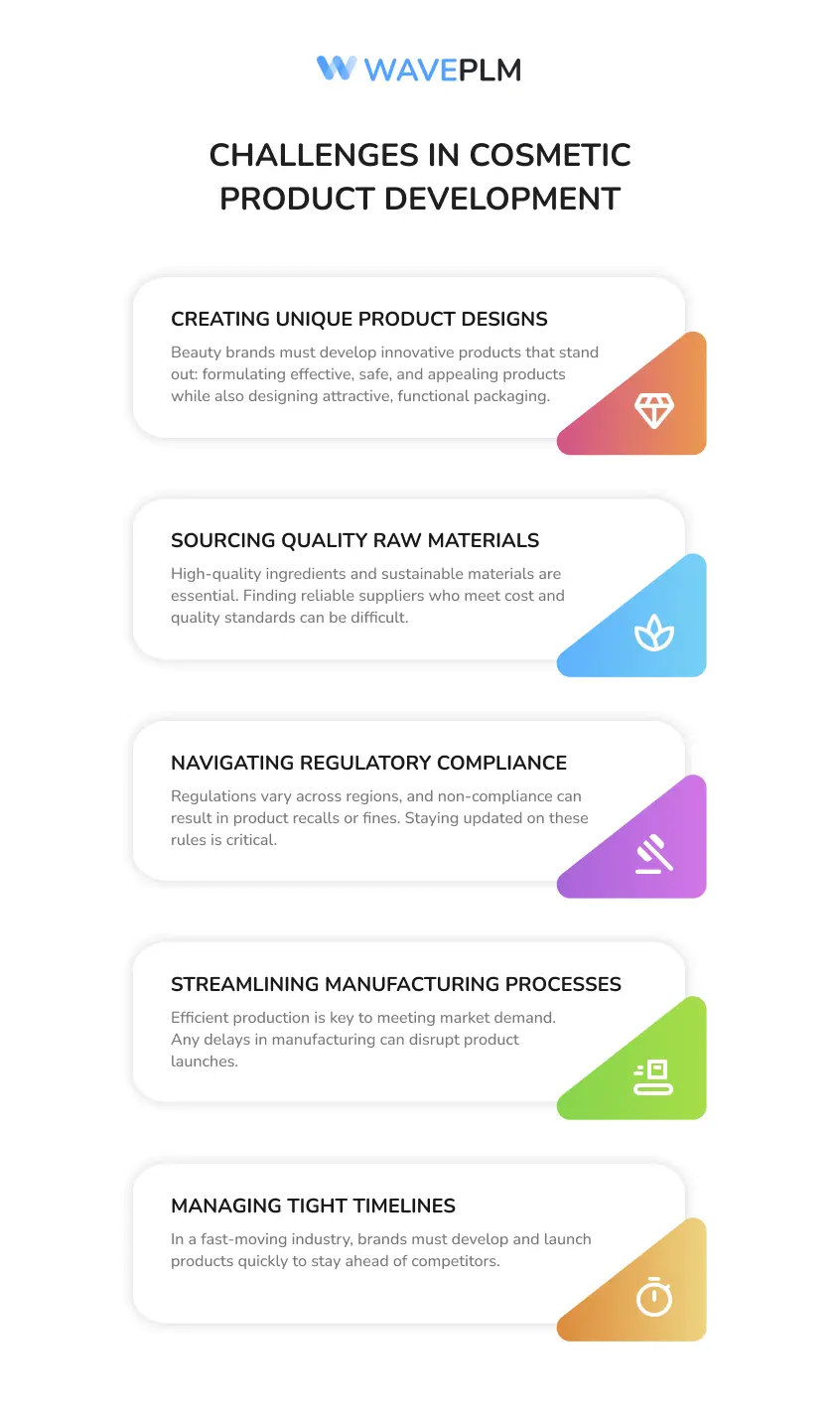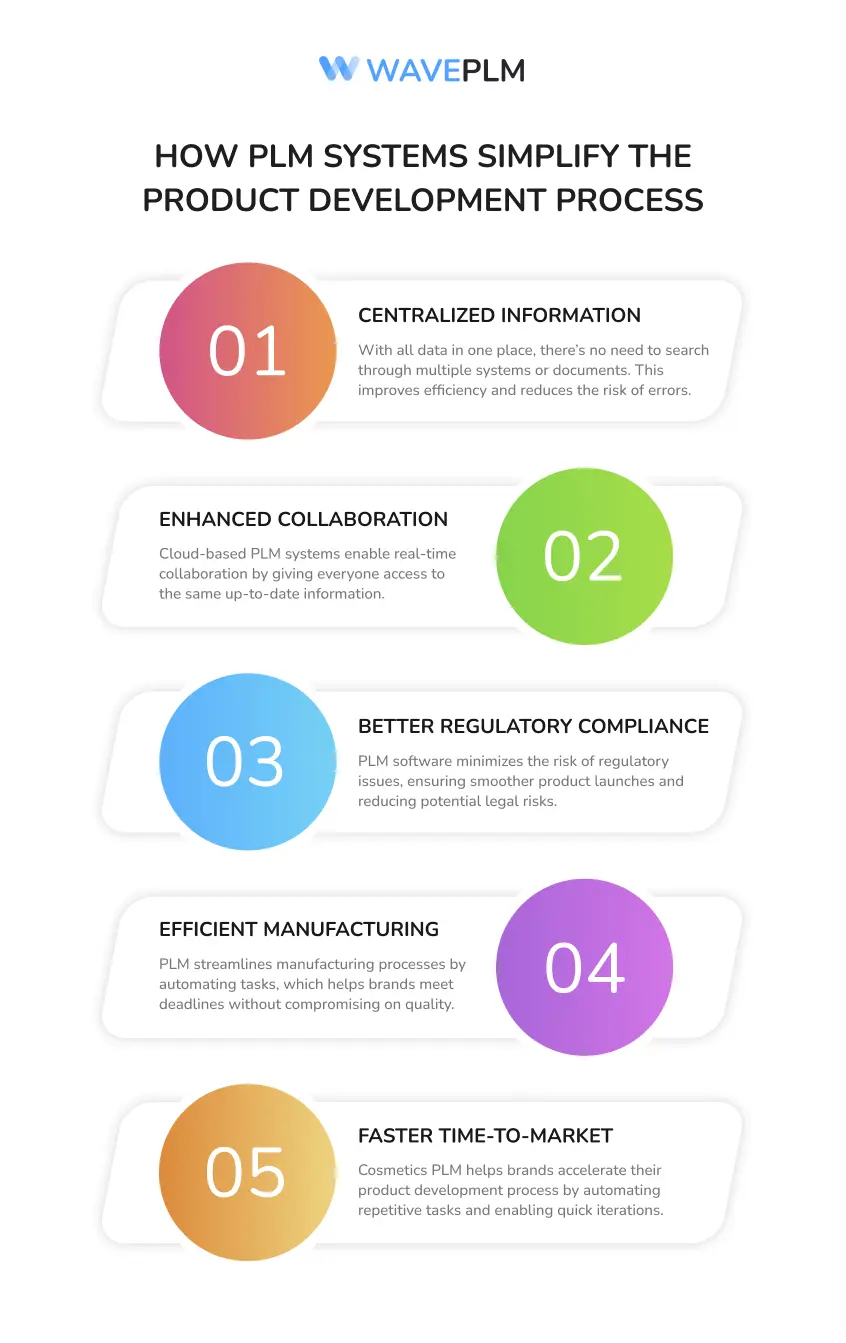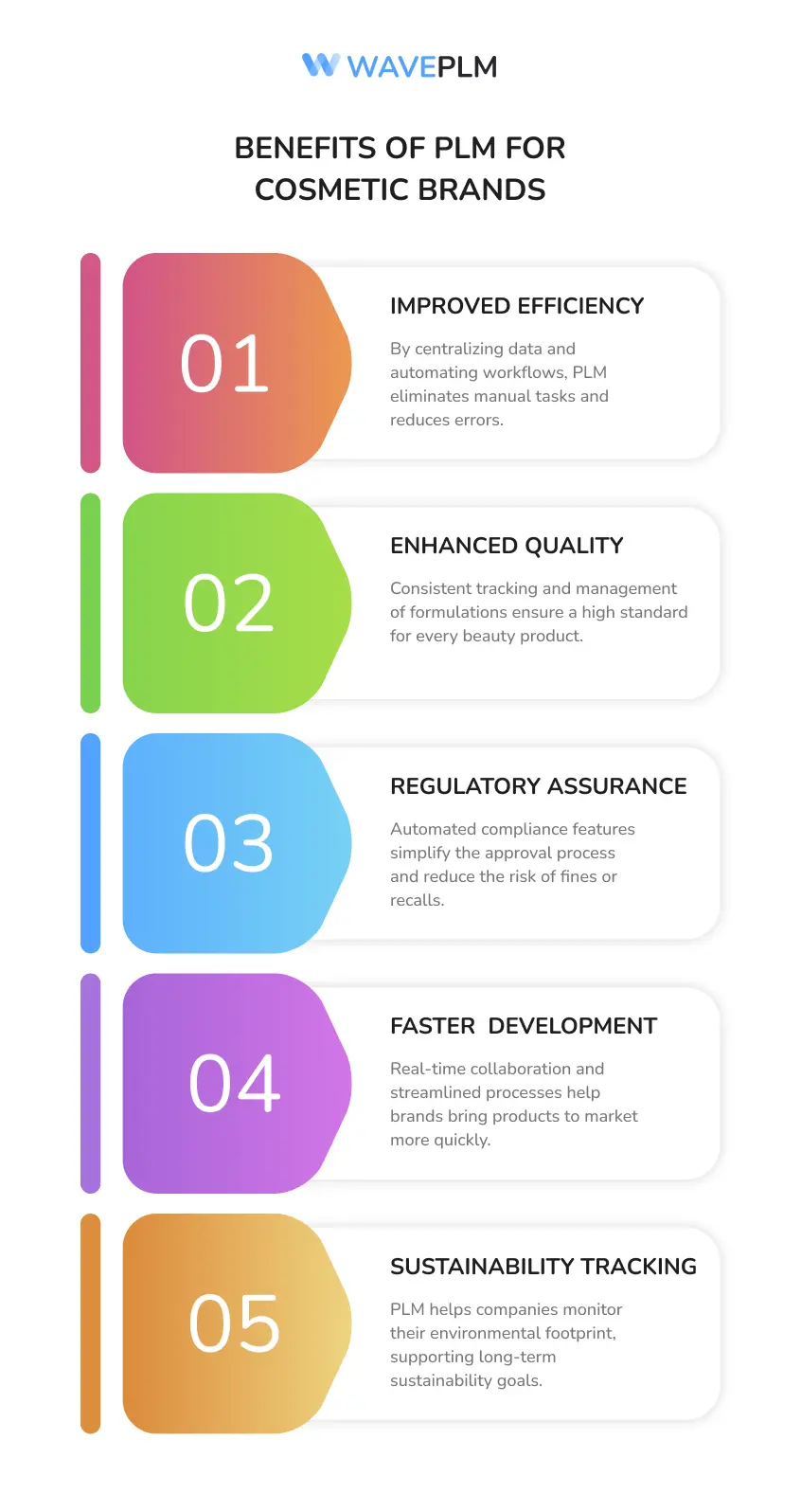
Cosmetics PLM
The beauty industry thrives on innovation. Every year, new trends emerge, driving demand for unique, high-quality beauty products. To stay competitive, cosmetic brands must speed up their product development process while maintaining top-notch quality. This involves everything from product concept and raw materials sourcing to manufacturing processes and final product launches. Managing all these aspects can be challenging without the right tools.
Navigating beauty means addressing the complexities of the beauty and personal care industry, including supply chain issues, materials management, and adapting quickly to rapid consumer trend changes.
This is where PLM software — specifically cosmetics PLM — comes into play. It helps brands streamline their operations, ensuring efficiency, compliance, and faster time-to-market. In this article, we’ll explore how PLM systems are revolutionizing cosmetic product development and why they are essential for beauty companies today.
Introduction to the Cosmetic Industry
The cosmetic industry is one of the most dynamic and fast-paced markets in the world, driven by ever-changing consumer demands, emerging trends, and the constant need for innovation. Cosmetic brands are under pressure to create innovative, high quality products that not only appeal to diverse consumer preferences but also comply with stringent regulatory requirements. Navigating this landscape requires a strategic approach to the product development process, where speed, efficiency, and compliance are paramount.
Product lifecycle management (PLM) software has become an essential tool for cosmetic brands aiming to stay ahead in this competitive market. By centralizing data and streamlining the product lifecycle, PLM software empowers companies to reduce time to market, improve margins, and ensure that every product meets the highest standards of quality and regulatory compliance. With the ability to manage every stage of the development process—from ideation to launch—PLM solutions enable brands to create innovative products that resonate with consumers and achieve long term success in the cosmetic industry.
Understanding Cosmetics PLM
PLM systems manage the entire lifecycle of a product, from initial idea to production and beyond. In the beauty sector, cosmetics PLM ensures that every step of the development process runs smoothly. Whether it’s creating innovative product designs, managing raw materials, or meeting regulatory requirements, PLM software keeps everything on track.
Modern PLM tools are often cloud-based, which allows multiple teams to access and share data in real time. This enables real-time collaboration and communication among the various groups involved in cosmetic product development, leading to better coordination, faster decision-making, and more efficient project management.
Challenges in Cosmetic Product Development
The journey from concept to market for a new beauty product involves multiple steps, each with its unique challenges:
- Creating Unique Product Designs. Beauty brands must develop innovative products that stand out. This includes formulating effective, safe, and appealing products while also designing attractive, functional packaging.
- Sourcing Quality Raw Material. High-quality ingredients and sustainable materials are essential. Finding reliable suppliers who meet cost and quality standards can be difficult.
- Navigating Regulatory Compliance. Regulations vary across regions, and non-compliance can result in product recalls or fines. Staying updated on these rules is critical.
- Streamlining Manufacturing Processes. Efficient production is key to meeting market demand. Any delays in manufacturing can disrupt product launches.
- Managing Tight Timelines. In a fast-moving industry, brands must develop and launch products quickly to stay ahead of competitors.
With so many cosmetics on the market, managing a high volume and complexity of products becomes challenging. PLM solutions help brands efficiently handle many cosmetics, streamline development, and ensure compliance across a diverse product range.
Without the right systems in place, these challenges can slow down the entire product development process and increase costs. Cosmetics PLM helps brands overcome these hurdles effectively.

Challenges in Cosmetic Product Development
How PLM Systems Simplify the Product Development Process
PLM software offers a range of features that make it easier for beauty brands to manage product development. By streamlining and optimizing each stage of the value chain—from supplier relationships and raw material sourcing to formulation, manufacturing, and distribution—PLM systems ensure efficiency and responsiveness across the entire product lifecycle. Here’s how it transforms the process:
1. Centralized Product Information
PLM solutions serve as a single source of truth for all product information. Teams can store and access critical data such as:
- Formulation details
- Ingredient specifications
- Packaging designs
- Regulatory documentation
- Consumer demographics for tailoring products to specific target markets
With all data in one place, there’s no need to search through multiple systems or documents. This improves efficiency and reduces the risk of errors.
2. Enhanced Collaboration
Developing a new cosmetic product involves collaboration across various departments, including R&D, marketing, supply chain, and quality control. Cloud-based PLM systems enable real-time collaboration by giving everyone access to the same up-to-date information.
This improves communication, reduces bottlenecks, and ensures that all teams stay aligned throughout the product development process. By streamlining and enhancing collaboration from concept to launch, PLM systems play a crucial role in efficient and compliant personal care product development.
3. Better Regulatory Compliance
Ensuring regulatory compliance with global regulations is a major challenge in the beauty industry. PLM software simplifies this by:
- Tracking the regulatory requirements for each market
- Flagging non-compliant ingredients automatically
- Generating necessary documents for product approvals
This minimizes the risk of regulatory issues, ensuring smoother product launches and reducing potential legal risks.
4. Efficient Manufacturing Processes
PLM systems streamline manufacturing processes by:
- Managing supplier relationships
- Tracking the availability of raw materials
- Ensuring production schedules stay on track
- Reducing waste by optimizing resource allocation and minimizing excess material use
By automating these tasks, PLM helps brands meet deadlines without compromising on quality.
5. Faster Time-to-Market
Speed is critical in the beauty sector. Cosmetics PLM helps brands accelerate their product development process by automating repetitive tasks and enabling quick iterations.
For instance, teams can make changes to formulations or packaging designs in real-time and immediately assess their impact. This agility allows brands to bring their products to market faster, staying ahead of trends and competitors. PLM also empowers brands to quickly develop and launch on trend products that meet current market demands.

How PLM Systems Simplify the Product Development Process
Supply Chain Management in Cosmetics
In the cosmetics industry, effective supply chain management is critical to delivering high quality products on time and at the right cost. Companies must coordinate the sourcing of raw materials from global suppliers, manage complex logistics, and adapt quickly to changing regulatory requirements. PLM systems provide a powerful solution by offering real-time visibility into every aspect of the supply chain, from inventory levels to supplier performance and sustainability metrics.
By leveraging a PLM system, cosmetic brands can ensure compliance with regulatory requirements, reduce costs through better resource planning, and foster innovation by enabling rapid development of new products and formulations. The ability to track raw materials and manage supplier relationships within a single platform not only streamlines operations but also supports the creation of more sustainable and innovative products. Ultimately, PLM systems help companies build a resilient supply chain that can adapt to market changes and drive long-term growth in the cosmetics industry.
Automated Workflows and Efficiency
Automated workflows are a cornerstone of modern PLM systems, transforming the way cosmetic brands manage their product development process. By automating routine tasks such as document management, approvals, and compliance tracking, PLM systems free up valuable time for teams to focus on high-impact activities like product development and innovation. This shift from manual tasks to automated processes leads to greater efficiency, fewer errors, and faster decision-making.
Moreover, automated workflows help ensure regulatory compliance by keeping all necessary documentation, certifications, and regulatory requirements organized and accessible in one platform. Real-time visibility into the development process allows teams to quickly identify and resolve issues, driving innovation and accelerating the path from concept to market. With PLM systems, cosmetic companies can streamline their operations, reduce bottlenecks, and maintain a competitive edge through continuous improvement and innovation.
The Role of Personal Care Software in Beauty Product Innovation
While PLM systems focus on managing the product lifecycle, personal care software provides additional tools for driving beauty product innovation. For personal care businesses, PLM software streamlines product development and ensures regulatory compliance, helping them stay competitive in a fast-paced market. It allows brands to:
- Analyze Ingredients: Ensure that each component meets safety and performance standards.
- Gather Consumer Insights: Use data to understand customer preferences and create products that meet specific needs.
- Monitor Sustainability Goals: Track the environmental impact of raw materials and production methods.
Together, cosmetics PLM and personal care software provide a comprehensive solution for developing innovative, high-quality products efficiently. In the personal care industry, digital transformation and innovation are crucial for staying ahead of market trends and meeting evolving consumer demands. PLM supports personal care brands by enhancing collaboration, ensuring product quality, and fostering innovation throughout the product lifecycle.
Benefits of PLM for Cosmetic Brands
Adopting PLM solutions offers numerous advantages for beauty companies, including:
- Improved Efficiency. By centralizing data and automating workflows, PLM eliminates manual tasks and reduces errors.
- Enhanced Product Quality. Consistent tracking and management of formulations ensure a high standard for every beauty product.
- Regulatory Assurance. Automated compliance features simplify the approval process and reduce the risk of fines or recalls.
- Faster Product Development. Real-time collaboration and streamlined processes help brands bring products to market more quickly.
- Sustainability Tracking. PLM helps companies monitor their environmental footprint, supporting long-term sustainability goals.
- Cost Effective Solution. PLM is a cost effective solution for streamlining operations and optimizing resource management.
PLM solutions are widely used not only in beauty but also in the cosmetics and personal care industry, where they help streamline product development, ensure compliance, and foster innovation.
By leveraging PLM, brands can better manage costs by optimizing resource allocation, reducing waste, and improving profitability.
PLM supports the development and commercialization of a wide range of consumer products, enabling innovation and efficiency across the industry.

Benefits of Cosmetics PLM
Implementing a PLM System
Implementing a PLM system is a strategic investment that can transform the way cosmetic companies operate, but it requires careful planning and consideration. To maximize the benefits, brands should assess their unique needs around regulatory compliance, quality control, and supply chain management. Choosing a scalable and user-friendly solution, such as Centric PLM, ensures that the system can grow with the business and adapt to evolving market demands.
A successful PLM implementation enables companies to reduce time to market, improve margins, and foster innovation by centralizing data and streamlining processes. It also strengthens quality control and regulatory compliance, helping brands stay ahead in the competitive cosmetic industry. By integrating PLM into their operations, companies can achieve long term success, respond quickly to market trends, and consistently deliver high quality products that meet consumer expectations.
Best Practices for PLM Adoption
To fully realize the value of a PLM system, cosmetic brands should follow best practices for adoption. Start by defining clear goals and objectives for the PLM initiative, ensuring alignment with overall business strategy. Establish a cross-functional team that includes representatives from R&D, quality, supply chain, and marketing to drive collaboration and ownership throughout the product lifecycle.
Providing comprehensive training and ongoing support is essential for user adoption and maximizing system benefits. Integrating the PLM system with other systems, such as ERP and CRM, creates a unified view of the product lifecycle and enhances decision-making. Regularly reviewing and updating the PLM system ensures it continues to meet business needs and supports continuous improvement.
By following these best practices, companies can reduce costs, drive innovation, and maintain high quality standards, ultimately staying ahead in the beauty market and securing long term success in the cosmetic industry.
Real-World Success Stories
Cosmetics companies have demonstrated significant success by leveraging PLM software to streamline operations, accelerate product development cycles, and optimize resource use.
Several leading beauty brands have successfully implemented PLM software to enhance their operations.
L’Oréal
L’Oréal uses PLM to manage its extensive range of beauty products. The company leverages centric software to streamline product development and ensure compliance with industry regulations. The system helps the company maintain high standards of quality and compliance across its global markets.
Estée Lauder
Estée Lauder leverages PLM for better project management. PLM has also enhanced Estée Lauder’s testing processes, supporting quality assurance and compliance. This has improved collaboration between teams, enabling faster product launches.
Unilever
Unilever uses PLM to streamline its R&D and manufacturing processes, leading to more efficient production cycles and reduced costs.
By leveraging the strategic advantages that PLM offers, Unilever has enhanced its ability to innovate, improve compliance, and maintain a competitive edge in the market.
Future Trends in Cosmetic Product Development
The beauty industry continues to evolve, and PLM software will play an even more significant role in the future. By fostering innovation, PLM will drive new product development and creativity in the beauty industry. Key trends include:
1. Sustainable Beauty
Consumers increasingly demand eco-friendly products. PLM helps brands meet these expectations by tracking the sustainability of their ingredients, packaging, and production methods.
The beauty and personal care industry is placing greater emphasis on sustainability and eco-friendly practices to address both consumer demand and regulatory requirements.
2. Personalized Products
Personalization is becoming a major trend in the beauty market. With personal care software, brands can analyze customer data and create customized products that cater to individual needs.
Personalization also plays a crucial role in the development and regulatory compliance of cosmetic products, ensuring that each product meets both customer preferences and industry standards.
3. Digital Transformation
The shift towards digital tools and processes will continue. Cloud-based PLM systems will be at the forefront, providing brands with the flexibility and efficiency needed to thrive in a digital-first world.
Conclusion
In today’s competitive beauty market, innovation and speed are more important than ever. Cosmetics PLM and personal care software provide the tools beauty brands need to streamline their product development process, enhance collaboration, and ensure compliance.
By adopting these technologies, companies can create innovative, high-quality products more efficiently, bringing them to market faster and staying ahead of trends. If your brand wants to stay competitive, investing in PLM solutions is a smart move for long-term success.




